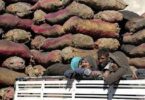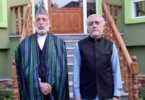KABUL (Pajhwok): First Vice-President Amrullah Saleh has illegally sacked four employees of the Anti-Heinous Crime Branch of the Ministry of Interior (MoI) for sharing information with the media. Pajhwok Afghan News has obtained a copy of the letter, dated March, 28, 2021, that was addressed to MoI’s Internal Security Department.
Written to the ministry’s Anti-Heinous Crime Branch, the letter reads that in accordance with the decision of the 6:30am meeting on April 6 and orders from the first vice-president, the four staff members should be introduced to Internal Security Department after the provision of initial information about them. It reveals that the four officials had disclosed information about the release of the Afghan Air Force pilots to the media.
Another letter, dated May 3, says Rafiullah, a member of the first group of the planned crime detection management and case investigator, Abdul Qahir, head of education and service enforcement, Roshan, a member of the intelligence management department, and Syed Inayatullah, the third-in-command of the department, have been fired. They were issued marching orders by the Anti-Corruption and Heinous Crime Branch head after being accused of leaking top-secret documents of the department.
However, Article 25 of the constitution says an accused person remains innocent and will not be punished until proven guilty by a court of law. The article adds: “Innocence is the original state. The accused shall be innocent until proved guilty by the order of an authoritative court.” Rizwan Murad, spokesman for the first vice-president, said the four individuals had been fired because they had disclosed information and documents to the media about the release of pilots in violation of the law and the principles of the Anti-Corruption and Heinous Crime Branch.
He did not name the media outlets with whom the secret documents were shared with. Pajhwok released a report on March 24, 2021 about the release of the two pilots. A presidential decree and some other MoI documents were cited as sources for the report. Two former air force officials, Gen. Amir Jan and Col. Zalmai had been imprisoned in connection with an embezzlement case. But they were released following a request from the first vice-president.
However, the four individuals did not provide any documents to Pajhwok. Abdul Qahir Hajar (one of the fired individuals), a former director of education who was later appointed as service director for enforcing contracts, said they had not provided any documents to Pajhwok or anyone else. “The minister knows the matter, and he is aware of my actions and innocence. But unfortunately, he says the order is from the first VP,” he added. The arrests come as Article 36 of the Access to Information Law says: “An individual who discloses information in good faith, if proved so, shall have appropriate legal, administrative and job protection and shall receive necessary support in accordance with the law.”
But details of embezzlement and release of the accused are not part of information that is prohibited under Article 16 of the Access to Information Law. The article says: “In the following instances, public access to information is prohibited: If the disclosure harms the country’s independence, national sovereignty, territorial integrity and public security. If the disclosure harms Afghanistan’s political, economic and social relations with other countries. If endanger the life and properties of an individual.
In case it becomes a barrier to the process of detection or presentation of a crime. In case it adversely affects detection, investigation or the prosecution of a suspect or a precautionary measure in such cases.
In case it adversely affects a fair trial or enforcement of a verdict. In case it violates the privacy of an individual. If such information is harmful to the legitimate commercial interests, private properties and bank accounts, unless the disclosure is allowed under any other law in force.
The second paragraph of the article cites copyright and other similar issues. It says information is provided to the applicant in case of public interest. The public interest is determined by the department concerned. Access to Information Commission Director Ainuddin Bahaduri said: “Institutions classify their documents involving security secrets, major economic secrets, or documents whose disclosure hurts the country’s diplomatic relations are considered confidential information.”
However, Bahaduri believed the release of documents involving no such issues should not be monitored. He suggested an institution must first classify its documents under the law so that its employees could differentiate between what documents were publishable and what were not. He explained the situation became a little bit difficult if documents were not classified. Each agency seemed to classify its documents according to its institutional interests, he said. “This undoubtedly limits access to information.”
The four sacked individuals, in a letter the Administrative Affairs Office at the Presidential Palace, wrote: “After the arrest of Gen. Amir Jan and Col. Zalmai, the Anti-Corruption and Heinous Crime Branch chief telephoned Roshan to release the detainees on the order of the first vice-president and the director of the branch. “But the two, who are in charge of enforcing contracts, have officially shared the matter with the Anti-Corruption and Heinous Crime Branch head.”
According to the letter, they prevented the release of the pilots. As a result, the Heinous Crimes Branch detained the two individuals (Syed Inayatullah and Roshan) for 24 hours. They added the Anti-Corruption Serious Crimes Branch had issued another “illegal order” to release the two pilots. The Administrative Affairs Office confirmed receiving the letter from the four individuals, but did not give further details.
Pajhwok shared the matter with the media office at MoI. However, the MoI media office has not yet responded to Pajhwok’s queries.






